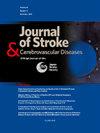Causal association between COVID-19 vaccination and thrombosis-related biomarkers/thrombosis/ischemic stroke: Mendelian randomization study
IF 2
4区 医学
Q3 NEUROSCIENCES
Journal of Stroke & Cerebrovascular Diseases
Pub Date : 2024-11-07
DOI:10.1016/j.jstrokecerebrovasdis.2024.108113
引用次数: 0
Abstract
Background
Observational studies about the association between coronavirus disease 2019 (COVID-19) vaccination and thrombosis/ischemic stroke are inconsistent. The aim of this study is to assess the causality between COVID-19 vaccination and thrombosis-related biomarkers/thrombosis/ischemic stroke using mendelian randomization (MR) analysis.
Methods
A two-sample MR analysis using publicly available genome-wide association study (GWAS) data was conducted. Causal effects were appraised using inverse variance weighted (IVW, as a primary method), with supplementary methods including constrained maximum likelihood and model averaging, MR-Robust Adjusted Profile Score, MR-Egger regression, simple mode, weighted median, and weighted mode. Sensitivity analyses were conducted using Cochran's Q test, MR-Egger intercept test, and leave-one-out analysis.
Results
Genetically predicted COVID-19 vaccination was negatively associated with C-C motif chemokine 3 [CCL3, odds ratio (OR): 0.694, 95% confidence intervals (CI): 0.484-0.995] and multiple coagulation factor deficiency protein 2 (MCFD2, OR: 0.806, 95% CI: 0.675-0.963). Meanwhile, the IVW analysis revealed significant causal effects between genetically predicted COVID-19 vaccination and ischemic stroke (OR: 1.088, 95% CI: 1.006-1.177), large artery stroke (LAS, OR: 1.251, 95% CI: 1.028-1.521). The leave-one-out analysis revealed that no individual SNP exerted a significant effect on the overall causal estimate.
Conclusion
Our study provided evidence supporting a potential causal association of genetically predicted COVID-19 vaccination with CCL3 levels, MCFD2 levels, ischemic stroke risk and LAS risk. These results provide preliminary evidence of potential adverse associations, but further studies are required to fully understand the mechanisms and to validate these findings across broader populations.
COVID-19疫苗接种与血栓相关生物标志物/血栓形成/缺血性中风之间的因果关系:孟德尔随机化研究。
背景:有关接种冠状病毒病2019(COVID-19)疫苗与血栓形成/缺血性中风之间关系的观察性研究结果并不一致。本研究的目的是利用亡羊补牢随机化(MR)分析法评估接种COVID-19疫苗与血栓相关生物标志物/血栓形成/缺血性中风之间的因果关系:利用公开的全基因组关联研究(GWAS)数据进行了双样本 MR 分析。因果效应的评估采用反方差加权法(IVW,作为主要方法),辅助方法包括约束最大似然法和模型平均法、MR-Robust Adjusted Profile Score、MR-Egger 回归、简单模式、加权中位数和加权模式。使用 Cochran's Q 检验、MR-Egger 截距检验和遗漏分析进行了敏感性分析:结果:基因预测的 COVID-19 疫苗接种与 C-C motif 趋化因子 3 [CCL3,比值比 (OR):0.694,95% 置信区间 (CI):0.484-0.995] 和多凝血因子缺乏蛋白 2 (MCFD2,OR:0.806,95% CI:0.675-0.963) 呈负相关。同时,IVW分析显示,基因预测的COVID-19疫苗接种与缺血性中风(OR:1.088,95% CI:1.006-1.177)、大动脉中风(LAS,OR:1.251,95% CI:1.028-1.521)之间存在显著的因果效应。撇除分析显示,没有单个 SNP 对总体因果关系估计值产生显著影响:我们的研究提供了证据,支持基因预测的 COVID-19 疫苗接种与 CCL3 水平、MCFD2 水平、缺血性中风风险和 LAS 风险之间存在潜在的因果关系。这些结果提供了潜在不良关联的初步证据,但还需要进一步的研究来充分了解其机制,并在更广泛的人群中验证这些发现。
本文章由计算机程序翻译,如有差异,请以英文原文为准。
求助全文
约1分钟内获得全文
求助全文
来源期刊

Journal of Stroke & Cerebrovascular Diseases
Medicine-Surgery
CiteScore
5.00
自引率
4.00%
发文量
583
审稿时长
62 days
期刊介绍:
The Journal of Stroke & Cerebrovascular Diseases publishes original papers on basic and clinical science related to the fields of stroke and cerebrovascular diseases. The Journal also features review articles, controversies, methods and technical notes, selected case reports and other original articles of special nature. Its editorial mission is to focus on prevention and repair of cerebrovascular disease. Clinical papers emphasize medical and surgical aspects of stroke, clinical trials and design, epidemiology, stroke care delivery systems and outcomes, imaging sciences and rehabilitation of stroke. The Journal will be of special interest to specialists involved in caring for patients with cerebrovascular disease, including neurologists, neurosurgeons and cardiologists.
 求助内容:
求助内容: 应助结果提醒方式:
应助结果提醒方式:


